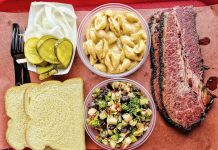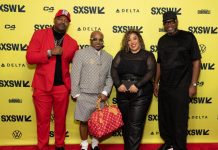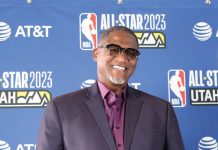On November 24, 2014, Atlanta was still in mourning, like the rest of the nation, over the death of Michael Brown, the unarmed black teenager gunned down in Ferguson three months earlier. Mourning turned into outrage that night when a grand jury decided not to indict Darren Wilson, the officer who ended Brown’s life. The next day, the outrage turned to action as thousands rallied at Underground Atlanta and, later, a few hundred protesters shut down the Connector.
To block Atlanta’s main artery, protesters marched south on Peachtree Street, past the Georgia Capitol, and toward the entrance to the Connector at Martin Luther King Jr. Drive. Standing on the highway, I watched protesters who, lane by lane, forced cars to slam on their brakes in an effort to choke off northbound traffic. It was a chaotic hour: With protesters chanting, state troopers tried clearing the highway. As horns blared, one white state trooper arrested an activist under the glow of a parked car’s headlights. The officer was young, no more than a few years on the job, and looked terrified as people pulled out cameras to record him.
It’s tense moments like that one—which could’ve easily gone awry—that Mayor Kasim Reed hoped to avoid in Atlanta following this week’s shootings in Louisiana, Minnesota, and Dallas. Following a peaceful protest on Thursday night, scores of demonstrators broke through a police barricade near North Avenue to block the highway. For about 15 minutes, they stopped traffic, only heading back to the city’s streets once police threatened arrest. The following day, a few hours before 10,000 protesters marched through downtown Atlanta’s streets toward CNN, Reed suggested standing on the freeway again would result in arrest.
“It is fundamentally unfair to everyone,” said Reed, flanked by his staff, more than a dozen of APD’s top brass, and several Atlanta councilmembers. “It puts the protesters at risk; it puts the women and men of our police department at risk; and people who are completely innocent at risk who are driving on a freeway trying to get to a loved one, and you had to hit the breaks because someone decided it was an appropriate form of protest to run in to 75-85.”
Civil disobedience that endangered lives, Reed argued, was not in the tradition of Rev. Martin Luther King, Jr.
“I want to send a clear message,” Reed added. “I have sat with people who have literally bled for our freedoms. I have sat with people who have held hands and literally locked arms with Dr. Martin Luther King. This behavior around our freeways is not going to be tolerated.”
Of course, there’s a long history of civil rights leaders risking their own lives to occupy public streets and highways—from Freedom Riders riding buses on Southern interstates to the three highway marches from Selma to Montgomery—in the name of tolerance. Despite Reed’s assertions, Atlanta protesters appeared determined to stop workers from commuting home on Friday night. Though blocking highways is a tactic that’s been highly criticized—one that, for instance, can prevent ambulances from getting to hospitals—some protesters believe the tactic is one of the most effective ways to have their voices be heard regarding police violence.
After the NAACP-organized rally in Centennial Olympic Park, thousands of protesters zigzagged across downtown, past the CNN Center, and eventually north on Williams Street toward the interstate entrance near Ivan Allen Boulevard. By the time they reached the exit, scores of state troopers had already parked the squad cars and motorcycles, each flashing their blue patrol lights, and formed a human wall bigger than the previous night. Protesters, looking to break through, stood face-to-face with the uniformed officers in a tense standoff that lasted past dusk. Ultimately, protesters were unable get past the patrolmen, but still managed to grab national headlines.
#AtlantaProtest This picture is amazing! pic.twitter.com/uFhC7SbhdQ
— 手TR❸Y手 (@treycb4) July 9, 2016
Soon, protesters slowly headed elsewhere in downtown Atlanta to continued their peaceful protests. As the crowd dissipated, Reed took off his jacket before heading into the streets to field questions from reporters. In doing so, he reiterated to activists the points he’d made earlier during his press conference at APD headquarters.
“Let’s just be the best versions of ourselves,” he told protesters, encouraging them to keep on exercising their constitutional rights “in the spirit of Dr. King.”
Indeed, only two out of 10,000 protesters were arrested. Reed lingered for a little while to address protesters’ frustrations about the police. (He said APD was as diverse as the city’s population and nonviolent, having only firing their weapons nine times out of 1.6 million interactions with residents in 2015.) Mostly, though, he listened. When it was time to go, one protester still had some questions unanswered about the recent Piedmont Park hanging that some speculated might have been a KKK-related lynching. Reed offered him a ride back to his office, where they could talk some more.
“Hop in the car,” the mayor said.













